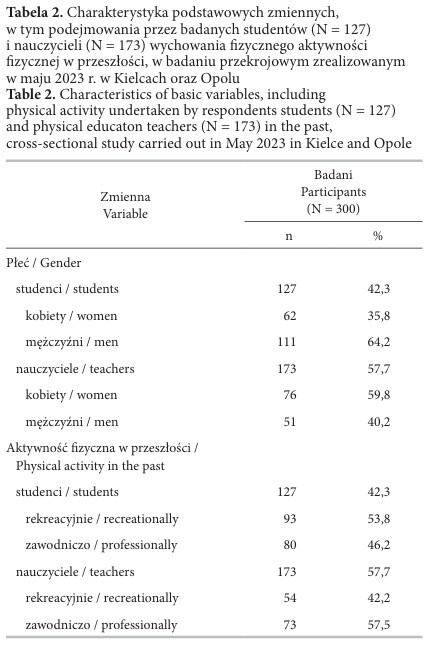Online first
Current issue
Archive
Most cited in 2024
About the Journal
Editorial Office
Editorial Board
Copyright and self-archiving policy
Information clause on the processing of personal data
Declaration of accessibility
Instructions for Authors
Instructions for Reviewers
Contact
Reviewers
2024
2023
2022
2020
2021
2019
2018
2017
2016
2015
2014
2013
Editing and translations
ORIGINAL PAPER
Determinants of health behaviors of physical education teachers and students
1
Politechnika Opolska / Opole University of Technology, Opole, Poland (Wydział Wychowania Fizycznego i Fizjoterapii / Faculty of Physical Education and Physiotherapy)
2
Uniwersytet Jana Kochanowskiego w Kielcach / Jan Kochanowski University of Kielce, Kielce, Poland (Instytut Nauk o Zdrowiu / Collegium Medicum)
3
Jednostka Wojskowa Komandosów w Lublińcu / Commando Special Forces, Lubliniec, Poland
Online publication date: 2024-09-06
Corresponding author
Paweł F. Nowak
Politechnika Opolska, Wydział Wychowania Fizycznego i Fizjoterapii, ul. Prószkowska 76, 45-758 Opole
Politechnika Opolska, Wydział Wychowania Fizycznego i Fizjoterapii, ul. Prószkowska 76, 45-758 Opole
Med Pr Work Health Saf. 2024;75(4):355-65
KEYWORDS
TOPICS
ABSTRACT
Background: The level of health behavior of physical education teachers and people preparing to perform this profession is important from the point of view of the need to play the role of a health promoter – an authority in the promotion of health culture. The aim of the study was to assess the level of teachers’ health behaviors of physical education teachers and students, as well as to search for their determinants. Material and Methods: The research covered 127 teachers and 173 physical education students. Standardized questionnaire tools were used to assess the level of health behaviors (Juczyński Health Behavior Inventory) and physical activity (International Physical Activity Questionnaire). Results: Teachers demonstrate a higher level of health behaviors than students. Most respondents achieved an average level of the general health behavior index (HBI) (53.1% of teachers, 52.3% of students), while a high level – 26.8% of teachers, 19.8% of students and a low level – 19.9% of teachers and 27.7% of students. Female gender and teaching profession are significant predictors of HBI. Physical activity, both its current level and the level undertaken in the past, as well as the body mass index (BMI) do not determine HBI. In the regression model, physical activity is significantly associated with male gender, past sports activity and a lower BMI level. Conclusions: Research indicates neglect in the general area of health behaviors among men, while among women, physical activity needs to be more widely popularized. The teacher education system should be more focused on the development of self-development competencies in the context of health-promoting behaviors. Med Pr Work Health Saf. 2024;75(4):355–365
Share
RELATED ARTICLE
We process personal data collected when visiting the website. The function of obtaining information about users and their behavior is carried out by voluntarily entered information in forms and saving cookies in end devices. Data, including cookies, are used to provide services, improve the user experience and to analyze the traffic in accordance with the Privacy policy. Data are also collected and processed by Google Analytics tool (more).
You can change cookies settings in your browser. Restricted use of cookies in the browser configuration may affect some functionalities of the website.
You can change cookies settings in your browser. Restricted use of cookies in the browser configuration may affect some functionalities of the website.






